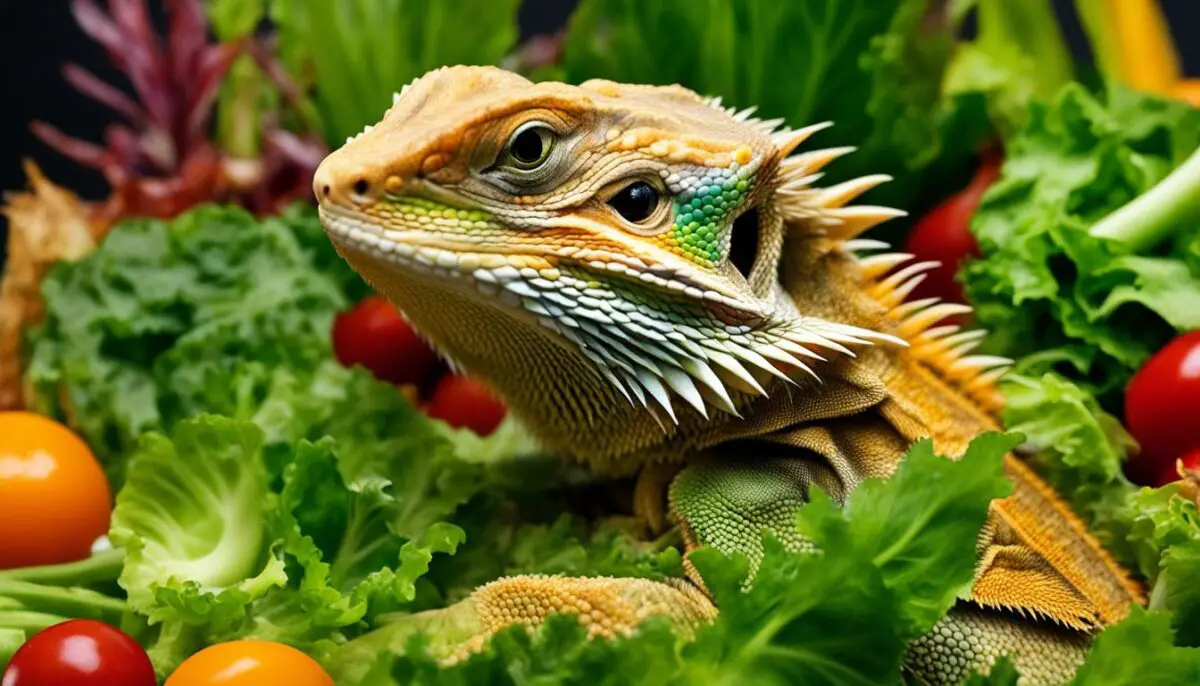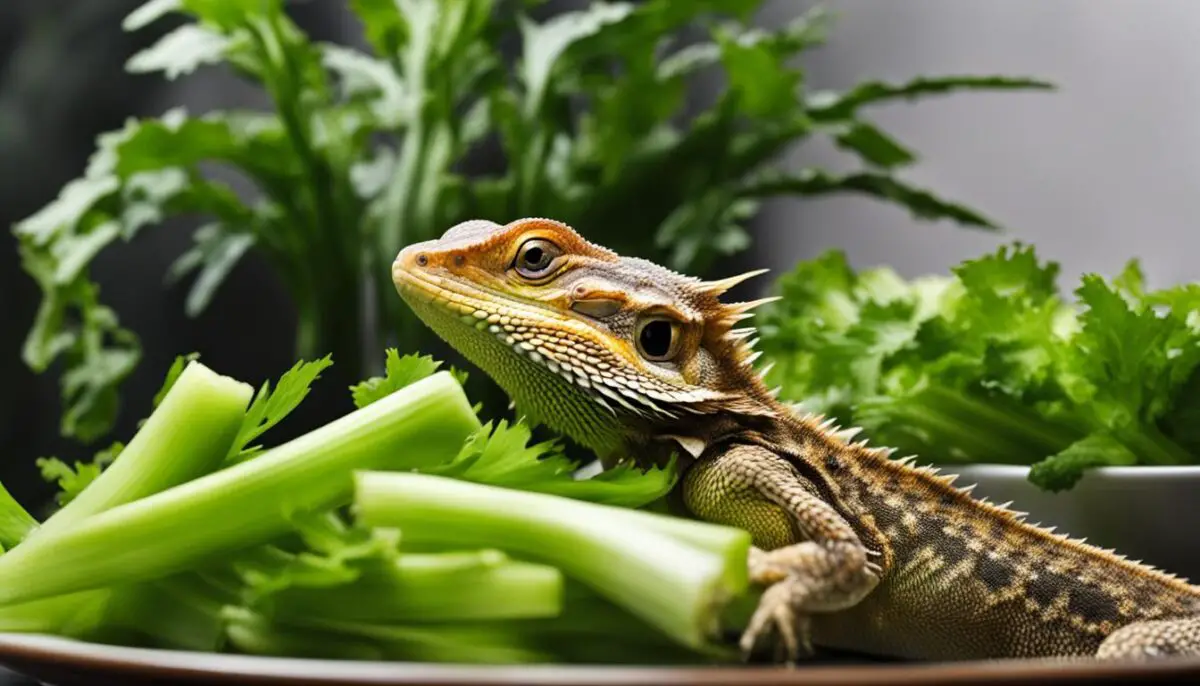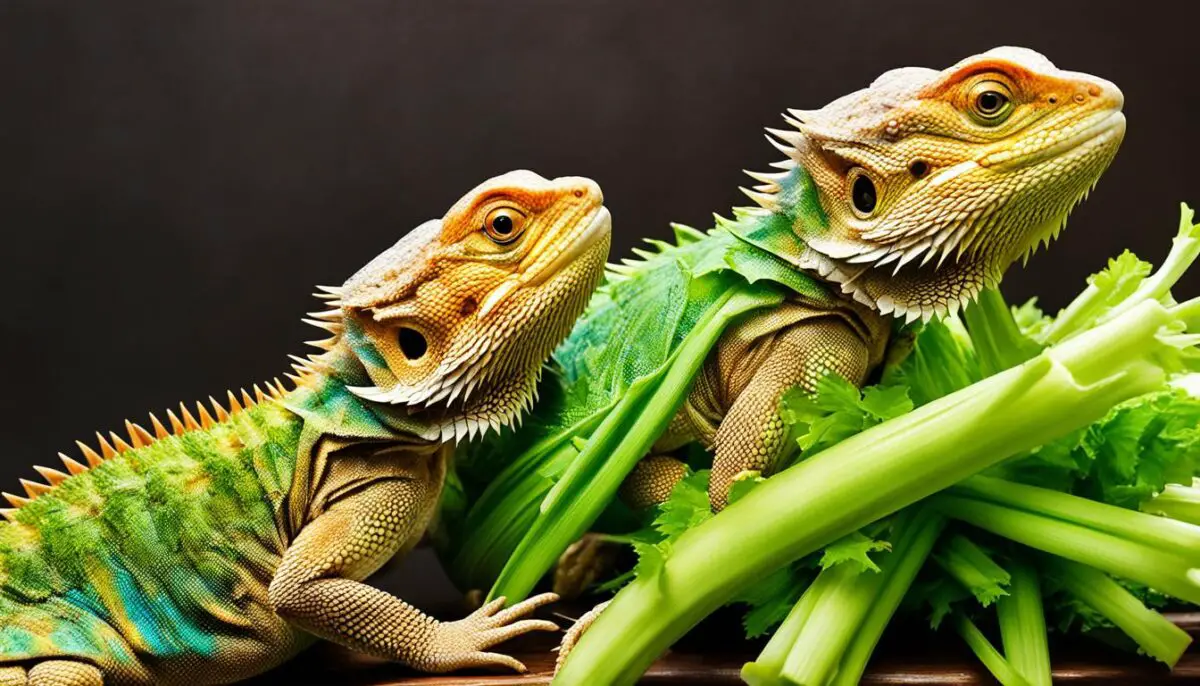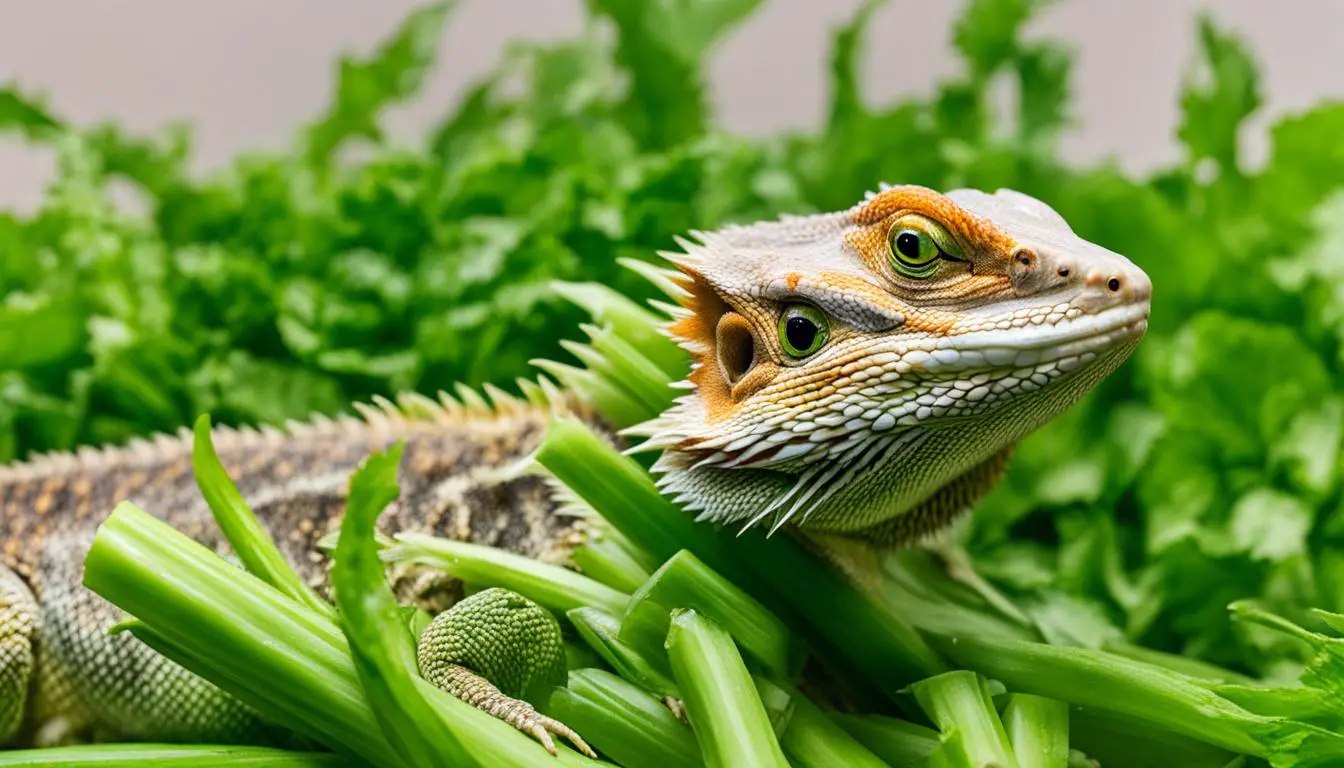Are you a proud owner of a bearded dragon and wondering if celery is a safe addition to their diet? You’ve come to the right place! In this article, we’ll explore whether celery is a suitable food option for bearded dragons and how it should be incorporated into their overall care and nutrition.
Key Takeaways:
- Celery can be fed to bearded dragons, but it should not be a daily staple in their diet.
- Bearded dragons are omnivorous and require a balanced mix of plant-based and animal-based foods.
- Celery contains some beneficial nutrients for bearded dragons, such as antioxidants and vitamin C.
- It’s important to feed celery to bearded dragons in moderation and alongside other nutritious vegetables and insects.
- While celery is safe for bearded dragons, it should be avoided if they have a history of kidney issues.
The Bearded Dragon Diet
Bearded dragons, like their name suggests, have a diverse diet that includes both plant-based and animal-based foods. As omnivorous reptiles, they require a balanced mix of nutrients to thrive. Let’s delve into the specifics of the recommended diet for these fascinating creatures.
Plant-Based Foods
Plant-based material should make up about 50% of a bearded dragon’s diet. Leafy green vegetables and flowers are essential components of their plant intake. These vegetables provide essential vitamins and minerals, as well as fiber, which aids in digestion.
When it comes to plant-based options, some vegetables stand out as the best choices for bearded dragons:
- Collard greens: Rich in calcium, these leafy greens are an excellent choice for bearded dragons. They contain essential nutrients like vitamin A and vitamin C.
- Mustard greens: These greens offer a good balance of vitamins and minerals, including vitamin K, vitamin C, calcium, and iron.
- Dandelion greens: This common weed is a nutritious option for bearded dragons, providing vitamins A, C, and K, as well as calcium and iron.
It’s important to note that some vegetables, like iceberg lettuce and celery, have low nutritional value and should be avoided as the main source of plant-based material in a bearded dragon’s diet.
Animal-Based Foods
The other 50% of a bearded dragon’s diet should consist of animal-based material. Insects are a crucial protein source for these reptiles. Feeder insects should be dusted with calcium powder before being offered to bearded dragons to ensure they receive the necessary amount of calcium.
The following insects are recommended for a bearded dragon’s diet:
- Crickets: A common and easily accessible option, crickets are a staple among bearded dragon keepers. They are high in protein and relatively easy to breed or purchase.
- Dubia roaches: These roaches are another popular choice due to their high nutritional value. They have a soft exoskeleton, making them easier for bearded dragons to digest.
When feeding animal-based foods, it is important to ensure their size is appropriate for the bearded dragon’s age and size. Younger dragons may require smaller insects or prey items.

The combination of plant-based and animal-based foods provides bearded dragons with a well-rounded and balanced diet. It is essential to offer a variety of vegetables and insects to ensure they receive all the necessary nutrients for their overall health and well-being.
Nutritional Value of Celery for Bearded Dragons
While celery may not be highly nutritious for bearded dragons, it does offer some important vitamins and minerals that contribute to their overall health. Here’s a breakdown of the nutritional content of celery:
| Nutrient | Amount per 100g |
|---|---|
| Iron | 0.2mg |
| Fiber | 1.6g |
| Calcium | 40mg |
| Vitamin A | 160IU |
| Vitamin E | 0.27mg |
| Vitamin K | 29.3mcg |
| Potassium | 260mg |
| Vitamin B-6 | 0.09mg |
| Magnesium | 11mg |
| Phosphorus | 24mg |
| Beta-carotene | 449mcg |
Despite its modest nutritional profile, celery is beneficial for bearded dragons due to its balanced calcium to phosphorus ratio. It also provides hydration due to its high water content, which is especially important for these reptiles.

Meeting the Nutritional Needs of Bearded Dragons
While celery can be a part of a bearded dragon’s diet, it should not be the sole source of nutrition. Bearded dragons require a varied and balanced diet to thrive. In addition to celery, their diet should include:
- Leafy green vegetables, such as kale, collard greens, and mustard greens
- Other vegetables, such as bell peppers, squash, and carrots
- Occasional fruits, such as berries and melons
- High-quality insects, such as crickets, mealworms, and dubia roaches
Bearded dragons have specific nutritional requirements, including a proper calcium to phosphorus ratio, as well as vitamin and mineral balance. It’s important to consult with a reptile veterinarian or a reptile nutritionist to ensure that your bearded dragon’s diet meets their specific needs.
Feeding Celery to Bearded Dragons
Celery can be a healthy addition to a bearded dragon’s diet, providing some nutritional benefits. However, it is important to feed celery to bearded dragons in moderation, alongside other nutritious vegetables and insects.
When feeding celery to your bearded dragon, it is crucial to wash the celery thoroughly and chop it into small, manageable pieces. This helps prevent choking hazards and ensures that your pet can easily consume and digest the celery.
Experts recommend feeding celery to bearded dragons about once a week. It should not be a daily staple in their diet, as their primary source of nutrition should come from leafy green vegetables and calcium-dusted insects.
Remember to offer a variety of vegetables and insects to ensure a balanced diet for your bearded dragon. Celery can be served alongside other bearded dragon-friendly vegetables, such as collard greens, mustard greens, and butternut squash. By incorporating different vegetables, you provide your pet with a diverse range of nutrients.
If you decide to feed celery to your bearded dragon, it is essential to monitor their response and overall health. Some bearded dragons may have a stronger preference for certain vegetables over others. If you notice any adverse reactions or changes in behavior, consult with a reptile veterinarian.
It is also worth noting that celery leaves are safe for bearded dragons to eat. The leaves can be a good source of hydration and offer additional variety to their diet.
Overall, while celery can be included in a bearded dragon’s diet, it should be offered in moderation and as part of a well-rounded meal plan. Remember to prioritize the nutritional needs of your bearded dragon and provide them with a diverse range of vegetables and insects for optimal health.

Pros and Cons of Feeding Celery to Bearded Dragons
Celery can be a beneficial addition to a bearded dragon’s diet, but it’s important to consider both the pros and cons before including it in their regular meal plan. Here are the advantages and disadvantages of feeding celery to bearded dragons:
Pros of Feeding Celery to Bearded Dragons
- 1. Balanced Calcium to Phosphorus Ratio: Celery contains a balanced ratio of calcium to phosphorus, which is essential for the overall health and bone development of bearded dragons.
- 2. High Water Content for Hydration: Celery has a high water content, which can help keep bearded dragons hydrated and prevent issues related to dehydration.
- 3. Fiber Content: The fiber in celery can aid in digestion and contribute to a healthy digestive system for bearded dragons.
Cons of Feeding Celery to Bearded Dragons
- 1. Low Nutrient Content: While celery offers some nutritional benefits, it is not highly nutritious compared to other vegetables that can be included in a bearded dragon’s diet.
- 2. Oxalates: Celery contains oxalates, which have the potential to bind to calcium and may lead to the formation of kidney stones in bearded dragons if fed excessively.
Considering the pros and cons, it is recommended to feed celery to bearded dragons in moderation. Including a variety of other vegetables that are higher in nutrients and lower in oxalates, such as leafy greens and squash, is crucial to ensure a balanced and nutritious diet for your bearded dragon.
| Pros of Feeding Celery to Bearded Dragons | Cons of Feeding Celery to Bearded Dragons |
|---|---|
| Balanced Calcium to Phosphorus Ratio | Low Nutrient Content |
| High Water Content for Hydration | Oxalates |
| Fiber Content |
Conclusion
In conclusion, celery can be a valuable addition to a bearded dragon’s diet, providing some nutritional benefits. However, it should not be the main staple in their meals. Due to its low nutrient content and oxalate levels, celery should be fed in moderation to ensure a balanced diet for bearded dragons.
To properly care for these reptiles, it is essential to offer a varied diet that includes a wide range of vegetables, fruits, and insects. This diversity will guarantee that bearded dragons receive all the necessary nutrients for their health and well-being.
Remember, while celery can be included in their meals, it should not replace other vital components of their diet. Providing a well-rounded and nutritionally balanced feeding plan is the key to keeping your bearded dragon healthy and thriving.
FAQ
Can bearded dragons eat celery?
Yes, bearded dragons can eat celery, but in moderation.
What nutritional value does celery offer for bearded dragons?
Celery provides antioxidants, flavonoids, beta carotene, vitamin C, and a balanced calcium to phosphorus ratio.
What percentage of a bearded dragon’s diet should be plant-based?
About 50% of a bearded dragon’s diet should consist of plant-based material.
What vegetables should make up the majority of a bearded dragon’s plant-based diet?
Leafy green vegetables and flowers should make up the majority of a bearded dragon’s plant-based diet.
Should bearded dragons eat fruits?
Yes, but fruits should only make up a small portion of a bearded dragon’s diet.
What animal protein sources are recommended for bearded dragons?
Calcium-dusted insects such as crickets and Dubia roaches are recommended as the animal protein source for bearded dragons.
How should celery be prepared for feeding bearded dragons?
Celery should be washed and chopped into small pieces before offering it to bearded dragons.
How often should bearded dragons be fed celery?
Bearded dragons can be fed celery once a week, as part of a balanced diet.
Are celery leaves safe for bearded dragons to eat?
Yes, celery leaves are safe for bearded dragons to eat.
What are the pros of feeding celery to bearded dragons?
The pros of feeding celery to bearded dragons include its balanced calcium to phosphorus ratio, high water content, and fiber content.
Are there any cons of feeding celery to bearded dragons?
Yes, celery is low in nutrients and contains oxalates, which can potentially cause kidney stones if consumed in excess.

